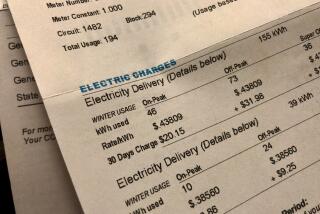Telephone Companies Hear Call of New Round of Competition : Telecom: Beginning Sunday, the local long-distance market will be open to all comers. The ad attack has already begun.
- Share via
The impending arrival of competition for local long-distance telephone service in California has set off a nasty marketing battle among telephone companies desperate for a piece of a $2-billion market.
Local long-distance, or toll, calling has long been the exclusive province of Pacific Bell and GTE, but on Jan. 1 it will be open to all comers--and the nation’s long-distance phone carriers in particular are pulling no punches as they try to seize a rare opportunity.
For the record:
12:00 a.m. Dec. 31, 1994 For the Record
Los Angeles Times Saturday December 31, 1994 Home Edition Business Part D Page 2 Column 1 Financial Desk 2 inches; 49 words Type of Material: Correction
Toll call rates--Sprint Corp.’s actual rates for three-minute daytime toll calls will be 30 cents for Santa Ana to Los Angeles, 33 cents for Pasadena to Riverside and 35 cents for Anaheim to Thousand Oaks. Rates provided by Sprint that appeared in a table in Friday’s editions were preliminary, and had been superseded by a final rate filing on Dec. 19.
Consider an ad from Express Tel, a Salt Lake City-based phone company. It shows a dry-cleaning store and says: “You should know this place well. Pacific Bell has been taking you there for years.” Another Express Tel ad shows three dead fish and asks, “What’s that smell?”
Jackson, Miss.-based LDDS, now the nation’s fourth-largest long-distance firm, is also on the attack. One ad shows a pair of handcuffs with “Pacific Bell” etched on them. The ad says, “You’re finally free to choose your own long-distance carrier for local toll calls.”
The aggressive tactics are not limited to the advertising arena: Competitors are offering aggressive discounts and technical assistance to lure prospective customers. And MCI Communications was busy Thursday alerting the media to a complaint it plans to file today with the California Public Utilities Commission alleging that Pacific Bell is unfairly preventing businesses that use Centrex service from switching their toll traffic away from Pacific Bell.
Centrex is a special local phone service for businesses, and MCI says Centrex customers will not be able to use an optional call-routing feature to choose an alternative toll carrier. Pacific Bell notes that Centrex customers can still dial a code to use another carrier and says it is not obliged to provide the routing feature for toll calls.
Some of the competitors say they have to use aggressive tactics--especially attacks on Pacific Bell--to raise their profiles with the public. As John Kennedy, a marketing executive with Express Tel, said, “We’ve been in the business market in California for 10 years, but we’re not exactly a household word.”
Express Tel hopes to create consumer awareness before competition heats up. Big competitors, including MCI and Sprint, have so far relied on direct mail and telemarketing to existing customers, saving their big pushes for the new year. More than 100 companies have told the PUC they plan to compete for local long-distance business--defined as calls between points more than 12 miles apart but within the local calling area. Those calls had been handled by either Pacific Bell or GTE.
For consumers, the competition means much cheaper toll calls. Pacific Bell and GTE are lowering their charges by an average of about 40%, and some long-distance carriers are promising even greater savings.
The trade-off for many consumers is that the cost of basic telephone service will rise. Basic rates for Pacific Bell residential customers will rise 35%, while basic rates for GTE residential customers will jump 60%. The PUC approved the increase in basic service rates to help offset the decrease in local long-distance rates.
In its ads, Pacific Bell and GTE are touting the declines in local long-distance charges but saying little about hikes in basic service rates.
AT&T;, in one of its ads, takes Pacific Bell to task for raising basic service charges. “What’s behind Pac Bell’s cutting their local toll call rates by 40%?” the AT&T; ad asks, adding, “Is it because Pac Bell will raise basic monthly service rates to help make up the difference?”
“Pacific has had quite a campaign touting their rates,” said an AT&T; spokesman. “We are trying to point out the whole environment is changing.”
So far, GTE, the smaller of the two local phone companies, has escaped attack. Pacific Bell hasn’t responded.
“Our research shows consumers don’t like the unfriendly nature of the ads they are seeing,” said Eileen Arbues, vice president of consumer marketing at Pacific Bell. “Historically in the long-distance market, companies, in their advertising, focus on each other. We choose to focus on the customer.”
But Pacific Bell and GTE have an advantage that allows them to stay above the fray: They do not have to provide so-called 1-plus dialing for toll calls. Although a customer who uses, for example, MCI for regular long-distance service only needs to dial a 1, the area code and number, the same customer using MCI for local long-distance will have to dial a five-digit code first. The customer will have to know the toll call boundaries in order to know when to use the codes.
Toward Utility Rate Normalization, a consumer group, thinks the need for an access code is enough to neutralize competitors. “It virtually guarantees that Pacific Bell and GTE will remain dominant carriers in the regional toll market,” says Regina Costa, a telecommunications analyst at TURN.
To make the system less cumbersome, MCI, Sprint and Express Tel, among others, are providing businesses with equipment that can electronically recognize which calls are toll calls and automatically dial the access code. In return, the customers must either agree to send a certain number of calls over the long-distance networks or to stay with the long-distance carrier for a year or more.
(BEGIN TEXT OF INFOBOX / INFOGRAPHIC)
New Phone Rates, New Choices
Beginning Jan. 1, local phone customers will for the first time be able to choose alternate carriers for handling “toll” calls--those which travel more than 12 miles but are still within a regional calling area. Although rates for toll calls will be dramatically lower, the monthly charge for basic residential phone service will increase. Pacific Bell’s will rise from $8.35 to $11.25 a month; GTE’s will increase from $9.75 to $17.25 per month. Here are some current and future prices for a three-minute daytime toll call:
From Santa Ana to Los Angeles
Company Rate Pacific Bell (current) $0.57 Pacific Bell (after Jan. 1) 0.36 AT&T; 0.34 MCI 0.30 Sprint 0.38 Express Tel 0.20 Cable & Wireless 0.21
From Pasadena to Riverside
Company Rate Pacific Bell (current) $0.84 Pacific Bell (after Jan. 1) 0.40 AT&T; 0.37 MCI 0.33 Sprint 0.41 Express Tel 0.20 Cable & Wireless 0.21
From Anaheim to Thousand Oaks
Company Rate Pacific Bell (current) $1.02 Pacific Bell (after Jan. 1) 0.42 AT&T; 0.37 MCI 0.33 Sprint 0.43 Express Tel 0.20 Cable & Wireless 0.21
Note: Sprint has a special promotional rate of one cent per minute for toll calls, which will expire at the end of February. The rates listed above are those Sprint will charge when the promotion expires. Smaller carriers such as Express Tel and Cable & Wireless charge a flat rate per minute for toll calls. Their rates are not distance-sensitive.
Sources: Pacific Bell, Sprint, GTE, Express Tel, Cable & Wireless, wire reports
Researched by ADAM S. BAUMAN / Los Angeles Times
More to Read
Inside the business of entertainment
The Wide Shot brings you news, analysis and insights on everything from streaming wars to production — and what it all means for the future.
You may occasionally receive promotional content from the Los Angeles Times.










